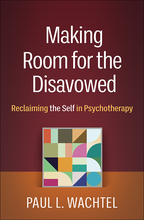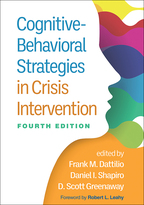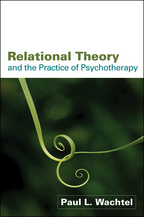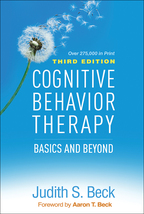Making Room for the Disavowed
Reclaiming the Self in Psychotherapy
Paul L. Wachtel
HardcoverPaperbacke-bookprint + e-book
Hardcover
orderSeptember 5, 2023
ISBN 9781462553181
Price: $77.00 336 Pages
Size: 6" x 9"
Paperback
orderSeptember 20, 2023
ISBN 9781462553174
Price: $51.00336 Pages
Size: 6" x 9"
e-book
orderAugust 11, 2023
PDF and Accessible ePub ?
Price: $51.00 336 Pages
ePub is Global Certified Accessible
print + e-book $102.00 $61.20
orderPaperback + e-Book (PDF and Accessible ePub) ?
Price: 336 Pages
ePub is Global Certified Accessible
“Wachtel eloquently presents a wonderful integrative approach in which making room is the pivotal process. Making room does not involve interpreting, modifying, or educating; it is about helping the person gain access to parts of self they have shied away from. This is the work on theoretical integration that the field has been waiting for.”

—Leslie S. Greenberg, PhD, Distinguished Research Professor Emeritus of Psychology, York University, Canada
“This is a groundbreaking volume from a giant of psychotherapy who has long sought ways to build bridges between psychodynamic thinking and other traditions. Wachtel's focus on making room challenges some aspects of traditional psychodynamic approaches; at the same time, it makes the psychodynamic methods described here immediately accessible and valuable to practitioners of humanistic approaches, third-wave cognitive-behavioral therapy, or many other varieties of modern psychotherapy. The book is brilliant and challenging—I highly recommend it.”

—Steven C. Hayes, PhD, Foundation Professor of Psychology Emeritus, University of Nevada, Reno; originator and co-developer of Acceptance and Commitment Therapy
“A necessary companion for practicing clinicians and students alike. Wachtel's book is like a microfiber cloth to clean our psychotherapist-lenses. It highlights the delicate and dynamic relationship between therapist and patient—and is a lesson on how to build a sturdy enough room to house it.”

—Esther Perel, MA, LMFT, private practice, New York City; podcast host, Where Should We Begin?
“This readable book embodies its own subject matter—expanding therapeutic conversations rather than forcing them into the narrow paradigms into which contemporary researchers and clinicians are socialized. Whether trained in DSM diagnoses, symptom-focused manuals, or authoritarian rules of interpretation, mental health professionals will find Wachtel’s book both incisive and liberating. Long admired for his deeply knowledgeable, respectful treatment of competing ideas, Wachtel breaks new ground in this integrative discourse on psychological healing. Beginning therapists will benefit from Wachtel's clarity, practicality, and humanity; seasoned clinicians will benefit from penetrating insights that support their best therapeutic instincts.”

—Nancy McWilliams, PhD, ABPP, Visiting Professor Emerita, Graduate School of Applied and Professional Psychology, Rutgers, The State University of New Jersey
—Leslie S. Greenberg, PhD, Distinguished Research Professor Emeritus of Psychology, York University, Canada
“This is a groundbreaking volume from a giant of psychotherapy who has long sought ways to build bridges between psychodynamic thinking and other traditions. Wachtel's focus on making room challenges some aspects of traditional psychodynamic approaches; at the same time, it makes the psychodynamic methods described here immediately accessible and valuable to practitioners of humanistic approaches, third-wave cognitive-behavioral therapy, or many other varieties of modern psychotherapy. The book is brilliant and challenging—I highly recommend it.”
—Steven C. Hayes, PhD, Foundation Professor of Psychology Emeritus, University of Nevada, Reno; originator and co-developer of Acceptance and Commitment Therapy
“A necessary companion for practicing clinicians and students alike. Wachtel's book is like a microfiber cloth to clean our psychotherapist-lenses. It highlights the delicate and dynamic relationship between therapist and patient—and is a lesson on how to build a sturdy enough room to house it.”
—Esther Perel, MA, LMFT, private practice, New York City; podcast host, Where Should We Begin?
“This readable book embodies its own subject matter—expanding therapeutic conversations rather than forcing them into the narrow paradigms into which contemporary researchers and clinicians are socialized. Whether trained in DSM diagnoses, symptom-focused manuals, or authoritarian rules of interpretation, mental health professionals will find Wachtel’s book both incisive and liberating. Long admired for his deeply knowledgeable, respectful treatment of competing ideas, Wachtel breaks new ground in this integrative discourse on psychological healing. Beginning therapists will benefit from Wachtel's clarity, practicality, and humanity; seasoned clinicians will benefit from penetrating insights that support their best therapeutic instincts.”
—Nancy McWilliams, PhD, ABPP, Visiting Professor Emerita, Graduate School of Applied and Professional Psychology, Rutgers, The State University of New Jersey













